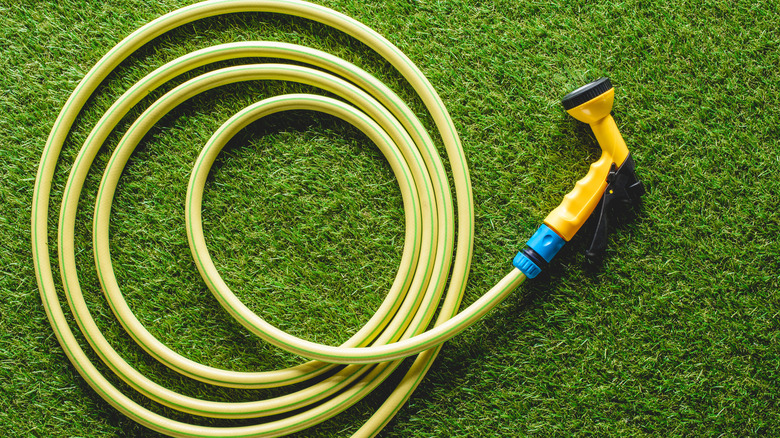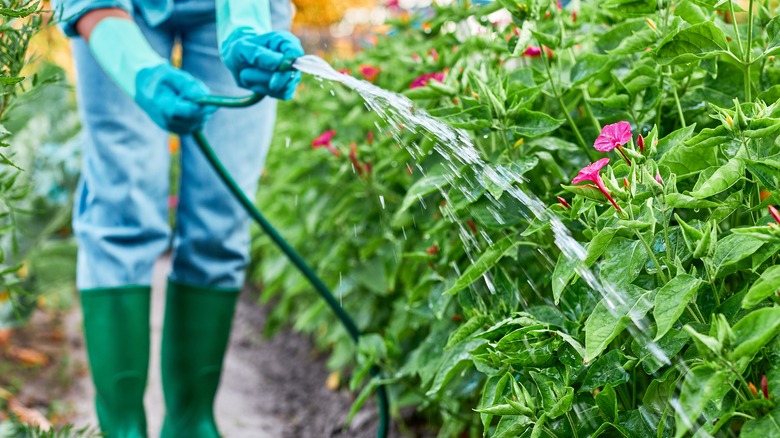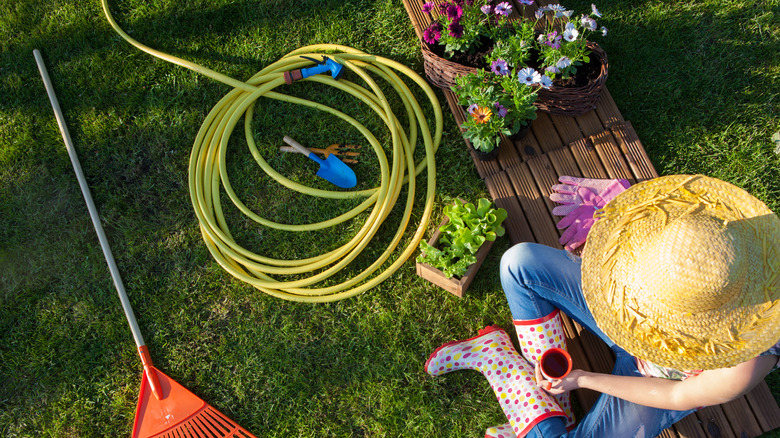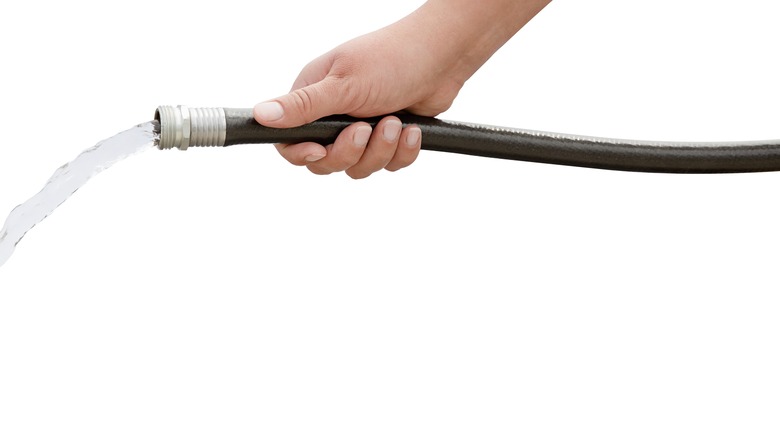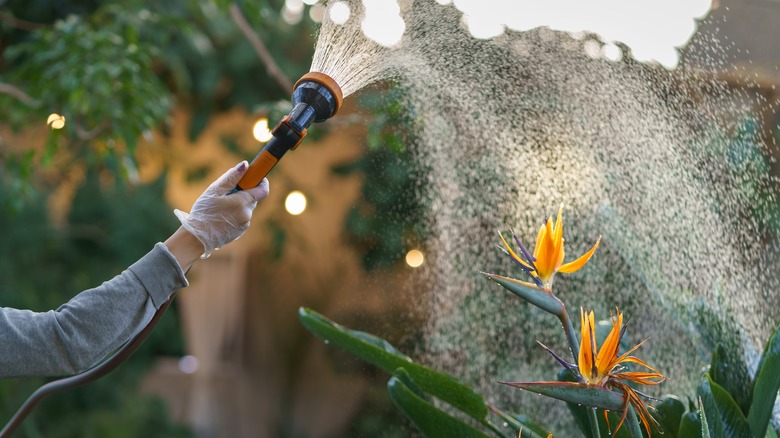What You Need To Know Before Buying A Garden Hose At Home Depot
Purchasing a garden hose from Home Depot likely feels like a simple task, but it can quickly get overwhelming. This big box home store has a wide selection of hoses, and many serve different functions. If you don't purchase a hose containing the proper features for your needs, you will be simply wasting money. If you purchase the correct one, you will be an inspiration to the neighborhood with your healthy plants and lawn.
According to Home Depot's website, there are many different hoses available outside of typical "garden" hoses, including soaker and expandable hoses. There are also different materials like vinyl and rubber. Not to mention various fittings, nozzle options, and hose maintenance requirements. While all of this sounds rather complex, it's actually easy to find a garden hose you'll love to use once you are clear on what you should be looking for, so keep reading for all that good hose shopping advice!
Rubber vs vinyl hoses
Garden hoses can be made out of two different materials — rubber and vinyl. Rubber hoses are more old-school and continue to be incredibly popular due to the fact they are the most durable you can buy. Rubber hoses stand the tests of both time and tough watering tasks because they are usually reinforced with nylon or polyester, according to Science Direct. Rubber hoses can safely pour out both hot and cold water and tend to be more crack-resistant than vinyl. The downside of rubber? For starters, it's more expensive. You can pay anywhere between $20-$100 for a rubber hose. They are also heavier than vinyl and can be damaged by too much sunlight.
Vinyl hoses, on the other hand, also come with their pros and cons. They are more affordable, ranging between $5 and $20. The higher-cost ones are still more affordable than a rubber hose and tend to be reinforced, which makes them last longer than their most affordable versions. Vinyl hoses are much lighter, which makes them an ideal choice for those who aren't strong enough to lug a heavy hose throughout a large yard. Unfortunately, vinyl hoses are more susceptible to kinks, cracks, and holes, which makes them less than ideal for daily, long-term watering. If you need a hose for more infrequent tasks or drought-friendly plants, or you live in a mild climate where the hose will not be exposed to extreme cold or heat, vinyl may be a good option.
Hose length
Garden hoses come in several different sizes — typically 25, 50, 75, and 100-foot lengths. According to Gardening Products Review, it can be tempting to purchase the longest hose to ensure you have plenty of give as you water your yard. However, this isn't always the best choice. After all, not only do the longest hoses cost the most, but they are also trickier to store and more difficult to lug around. Instead, take the time to measure the longest distance from your water spigot to your furthest plant. You won't need anything longer than this.
For apartment dwellers or those watering only a balcony or patio yard, the shorter hose lengths work just fine. For those living in a typical urban or suburban neighborhood, a 50-foot hose usually will get the job done. The extra long hoses should be reserved for huge yards or commercial gardening.
Hose width
When it comes to hose width, there are two standard options — 5/8 inch and 3/4 inch. The majority of garden hoses will be 5/8 inches in diameter and can be easily purchased at Home Depot. According to Electronics Hub, even though 5/8 inch is the most commonplace hose width, it is not always the most effective. A hose with this measurement will discharge approximately 44 gallons of water every minute if it's a 25-foot-long hose. And the longer it is, the more decreased the pressure. For example, a 100-foot house will discharge only 11 gallons of water. This makes a 5/8 inch hose a good option if you want to conserve water or have plants that require a specific amount of water or a gentler spray.
A 3/4 inch water hose is harder to find and tends to be considered more heavy-duty. However, Home Depot does sell them, and they have some great advantages. At 25 feet, they can spray up to 72 gallons of water each minute, which makes watering your yard quick and effective. They are also great for spraying dirt and grime off of a deck, watering trees, durable plants, and other greenery that aren't afraid of a good blast of water.
Types of hoses
Finally, there are different types of hoses to choose from when you're looking for your perfect garden waterer. These include light-duty, flexible, expandable, garden soaker, coiled, drinking water, and flat hoses. Light duty hoses are the vinyl hoses listed above and are great for gardening on a budget or infrequently. Flexible hoses can also be vinyl, as well as the aforementioned rubber hoses. They are the easiest to purchase off of store shelves and are what most people envision when they think of a garden house.
According to Irrigation Supplies, expandable hoses are an "as seen on TV" type of hose that is able to stretch up to three times their length when they fill up with water. They are brightly colored and very lightweight. Garden soaker hoses are typically created from rubber and are used for garden irrigation. Instead of spraying water directly out of a nozzle, this type of hose is laid onto the ground or buried under some dirt. Coiled hoses are shorter in length and smaller in diameter, and they are ideal for hand watering potted plants or in smaller areas like an apartment balcony garden. Drinking water hoses are free from lead and safe for enjoying an outdoor drink like you had when you were a child. Finally, flat hoses are similar to a fireman's hose, flat when stored and round when filled with water. They are great for space-conscious gardeners.
